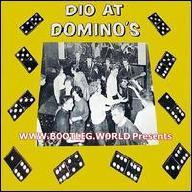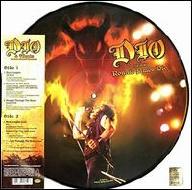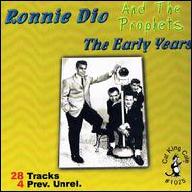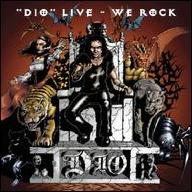While Blackmore's original musical plan for Rainbow was to get back to basics (the complete opposite of what the rock dinosaur Deep Purple had become toward the end), the new group ended up sounded more or less like Purple -- in fact, a more apparent prog rock edge was added. Such hit albums as 1975's Ritchie Blackmore's Rainbow, 1976's Rising, 1977's On Stage, and 1978's Long Live Rock 'n' Roll helped introduce Dio to the heavy metal masses worldwide, but when Blackmore made it clear that Rainbow were his band, Dio jumped ship. Shortly thereafter, Dio received word that Ozzy Osbourne had left Black Sabbath, and a tryout was arranged. Dio got the gig immediately (penning most of the Sab classic Children of the Sea at their initial jam session), and helped Sabbath break out of their creative and commercial slump, resulting in such metal classics as 1980's Heaven and Hell and 1981's Mob Rules. With Sabbath enjoying their greatest success in years, Dio shocked the metal world by leaving what appeared to be a promising union after the spotty Live Evil release appeared in 1982.
Fed up with the "singer for hire" tag that was bestowed upon him by many, Dio set out to form his very first solo project, called simply Dio. Similar in style to his previous bands but with a slightly more commercial edge, Dio's first two solo albums, 1983's Holy Diver and 1984's Last in Line, racked up platinum sales -- making the band an arena headliner in its own right (complete with a highly theatrical and prop-heavy stage show). In 1985, Dio also found time to lead a heavy metal version of Band Aid/USA for Africa called Hear 'n Aid, which saw an all-star group of metallists performing a Dio-penned song, Stars, with all the funds of the single and album of the same name going to fight starvation in Africa. Although Dio couldn't sustain their initial commercial success, they remained a consistent metal attraction. In the early '90s, Ronnie mended his differences with his old Sabbath mates, and found himself fronting the band once again for an album, 1992's Dehumanizer, and subsequent tour. Predictably, the reunion didn't last long, and he returned back to solo work, resulting in such albums as 1996's Angry Machines, 2000's Magica, and 2002's Killing the Dragon.
In 2006 Dio reunited with his late-era Black Sabbath brethren Tony Iommi, Geezer Butler, and Vinny Appice to form Heaven Hell, named after Sabbath's first recording with Dio in 1980. Heaven Hell toured in 2007 and released the two-disc CD/DVD Live from Radio City Music Hall later that year, and the full-length studio recording Devil You Know arrived in 2009. However, in November of that year Dio's wife, Wendy, announced that the singer was suffering from stomach cancer, although indicating that the disease was in its early stages and expressing hope for a full recovery and return to performing. Nevertheless, Heaven Hell subsequently canceled their summer 2010 touring plans and, sadly, Ronnie James Dio succumbed to the disease on May 16, 2010, at the M.D. Anderson Cancer Center in Houston, Texas. ~ Greg Prato, Rovi















